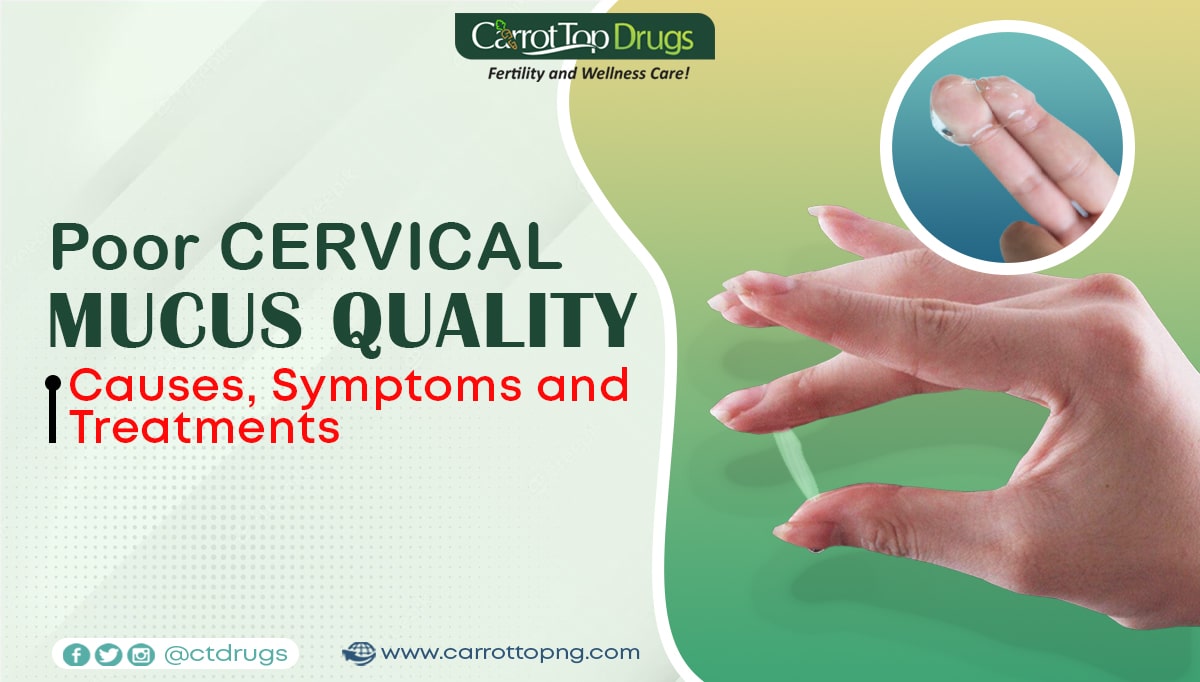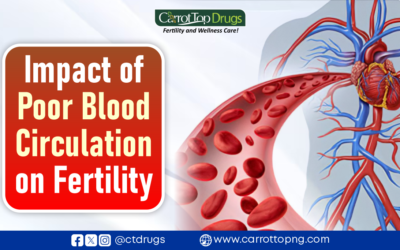Cervical mucus is a fluid produced by the cervix that plays a vital role in the fertilization process by helping sperm reach the egg. However, poor cervical mucus quality can hinder this process, making it difficult to conceive. In this article, we will explore the causes, symptoms, and treatments of poor cervical mucus quality.
What is Poor Cervical Mucus Quality?
Poor cervical mucus quality refers to cervical mucus that is not optimal for sperm survival and transport. It can be too thick, too thin, too acidic, or not produced at all. This can make it difficult for sperm to reach the egg, hindering the fertilization process.
Causes of Poor Cervical Mucus Quality
Several factors can lead to poor cervical mucus quality. Some of the common causes are:
Hormonal Imbalances
Hormonal imbalance is a condition in which the hormones in the body are not in their right proportion. It could mean excess or less amount of hormones. This imbalance can have a significant impact on the quality of cervical mucus. When there is poor cervical mucus, it can make it difficult for sperm to reach the egg. This reduces the chances of conception.
One common cause of poor cervical mucus is low levels of estrogen. Estrogen is responsible for maintaining the consistency of cervical mucus. When the levels of estrogen are low, the mucus can become too thick and sticky. This type of mucus can be difficult for sperm to penetrate, making it more challenging for conception to occur.
On the other hand, high levels of estrogen can also result in poor cervical mucus. When estrogen levels are too high, the mucus can become too thin. This makes it difficult for sperm to travel through the cervix and reach the egg. This thin mucus can hinder sperm transport and reduce the likelihood of conception.
Infections
Infections in the reproductive tract can have a significant impact on the quality of cervical mucus. Sexually transmitted infections (STIs) like chlamydia and gonorrhea can cause inflammation in the cervix. These may lead to the production of abnormal cervical mucus.
When the reproductive tract becomes infected, it can cause changes in the cervix. These changes affect the production of cervical mucus. For example, chlamydia and gonorrhea can cause inflammation in the cervix. This can lead to the production of abnormal cervical mucus. This type of mucus may be too thick or too thin, making it difficult for sperm to penetrate and reach the egg.
Additionally, some STIs can cause scarring or blockages in the reproductive tract. This can also affect fertility. For example, pelvic inflammatory disease (PID) can cause scarring in the fallopian tubes. This makes it difficult for the egg and sperm to meet. This can reduce the chances of conception and increase the risk of ectopic pregnancy.
Medications
Certain medications can have a negative impact on cervical mucus, resulting in poor cervical mucus quality. Antihistamines, decongestants, and antidepressants are among the medications that can cause dryness of the cervical mucus. As we have stated, these affect fertility.
Antihistamines and decongestants are commonly used to treat allergies and cold symptoms. However, they can also dry out cervical mucus. Antidepressants can affect the levels of hormones in the body. This can in turn impact cervical mucus production.
If you are taking any medications that may affect cervical mucus quality, it is important to talk to your doctor about your concerns. Your doctor may be able to adjust your medication.
Dehydration
Dehydration is one of the most common causes of poor cervical mucus quality. When the body is dehydrated, it may not produce enough cervical mucus or the mucus may become thick and sticky, making it difficult for sperm to reach the egg.
Dehydration occurs when the body loses more fluid than it takes in. Some factors that can cause dehydration include:
Not drinking enough fluids:
If you’re not drinking enough water or other fluids, your body may not have enough fluid to function properly.
Excessive sweating:
When you sweat excessively, your body loses water and electrolytes, which can lead to dehydration.
Diarrhea:
Diarrhea can cause dehydration by increasing fluid loss from the body.
Vomiting:
Vomiting can cause dehydration by expelling fluids from the body.
Fever:
A high fever can cause sweating and fluid loss, which can lead to dehydration.
Excessive urination:
If you urinate frequently, your body may lose too much fluid, leading to dehydration.
Certain medications:
Some medications such as diuretics can cause increased urination, leading to dehydration.
Diabetes:
High blood sugar levels in diabetes can cause increased urination, leading to dehydration.
Alcohol consumption:
Alcohol is a diuretic that can cause increased urination, leading to dehydration.
Exercise:
Intense exercise can cause excessive sweating and fluid loss, leading to dehydration.
Age
As women age, their reproductive systems undergo natural changes that can affect fertility. One of the things that age affects is the cervical mucus quality. This can lead to poor cervical mucus, making it more difficult for sperm to reach the egg.
One of the main reasons for this decline is the natural decrease in estrogen levels that occurs as women approach menopause. As estrogen levels decrease, the cervical mucus may become thinner, drier, and less abundant. This reduction makes it more difficult for sperm to reach the egg.
Stress
Stress is another factor that can contribute to poor cervical mucus quality. Chronic stress can disrupt the delicate hormonal balance in the body. As stated above, this can have a negative impact on cervical mucus production.
When the body is under stress, it produces a hormone called cortisol. Elevations in cortisol levels can suppress the production of other hormones. These hormones are responsible for regulating the menstrual cycle and cervical mucus production. This can lead to a decrease in the quantity and quality of cervical mucus, making it more difficult for sperm to reach the egg.
In addition, stress can also cause an increase in inflammation or a decrease in cervical fluid pH. These can further contribute to poor cervical mucus quality.
Poor Nutrition
Poor nutrition can also contribute to poor cervical mucus quality. A diet that is low in certain nutrients can affect cervical mucus production and quality. One such nutrient is zinc.
Zinc is an essential nutrient that is involved in the production of cervical mucus. Zinc helps to support the production of enzymes and hormones that are important for cervical mucus production. A deficiency in zinc can lead to a decrease in the quantity and quality of cervical mucus.
In addition to zinc, other important nutrients for cervical mucus production include vitamins C, E, and omega-3 fatty acids. A diet that is low in these nutrients may also contribute to poor cervical mucus quality.
Symptoms of Poor Cervical Mucus Quality
The symptoms of poor cervical mucus quality can vary depending on the severity of the condition. Some of the common symptoms are:
- Dryness or absence of cervical mucus
- Thick or sticky cervical mucus
- Watery cervical mucus that does not stretch
- Irregular menstrual cycles
Diagnosing Poor Cervical Mucus Quality
Poor cervical mucus quality can have a significant impact on a woman’s ability to conceive. If you suspect that you have poor cervical mucus quality, it’s essential to visit your healthcare provider as soon as possible.
During your visit, your healthcare provider may perform a physical exam, including a pelvic exam, to check for any abnormalities that may be affecting your cervical mucus. This exam can help your provider identify any potential issues that may be contributing to poor cervical mucus quality.
In addition to the physical exam, your provider may also order tests like a hysterosalpingogram (HSG) or a transvaginal ultrasound to further evaluate your cervical mucus. An HSG is a type of X-ray that can help your provider see if there are any blockages or abnormalities in your fallopian tubes or uterus. A transvaginal ultrasound is a non-invasive imaging test that can provide detailed images of your reproductive organs.
After carrying out these tests, your healthcare provider would ascertain your condition.
Treating Poor Cervical Mucus Quality
The treatment for poor cervical mucus quality depends on the underlying cause. Some of the common treatments are:
Hormone Therapy
Hormone therapy is a treatment option for women experiencing poor cervical mucus quality due to hormonal imbalances. If low levels of estrogen are the cause of the problem, hormone therapy may be prescribed. This therapy is to regulate the levels of this hormone in the body.
Estrogen is a key hormone that is involved in many aspects of reproductive health, including cervical mucus production. If levels of estrogen are too low, the cervical mucus may become thick and sticky. By regulating estrogen levels through hormone therapy, it may be possible to improve cervical mucus quality and increase fertility.
Hormone therapy may involve the use of estrogen-containing medications, such as birth control pills or patches, or other medications that help to regulate hormonal balance. The specific type of hormone therapy prescribed will depend on the individual’s unique needs and medical history.
While hormone therapy can be effective in improving cervical mucus quality and increasing fertility, it is important to note that it is not without risks. Like any medication, hormone therapy can have potential side effects and should be used under the guidance of a healthcare provider.
Antibiotics
If the cause of poor cervical mucus quality is an infection, antibiotics may be prescribed to treat the infection and reduce inflammation in the cervix. By treating the infection with antibiotics, it is possible to clear up the infection and reduce inflammation, which can improve cervical mucus quality.
Antibiotics are medications that are used to treat bacterial infections. They work by killing or stopping the growth of bacteria in the body. The type of antibiotic prescribed will depend on the specific type of infection being treated. In some cases, a combination of antibiotics may be used to effectively treat the infection.
It is important to note that antibiotics should only be used under the guidance of a healthcare provider and should be taken as prescribed. Failure to take antibiotics as prescribed or stopping treatment early can lead to the development of antibiotic-resistant bacteria, which can be difficult to treat.
Lifestyle Changes to Improve Cervical Mucus Quality
In addition to medical treatments, there are several lifestyle changes that you can make to improve the quality of poor cervical mucus quality:
Stay hydrated by drinking plenty
Avoid smoking and alcohol, as they can dehydrate the body and affect the quality of cervical mucus.
Eat a healthy, balanced diet rich in vitamins and minerals, which can improve overall reproductive health.
Use lubricants that are specifically designed for fertility and avoid those that can damage sperm, such as those containing glycerin or parabens.
Have sex during the most fertile days of the menstrual cycle when the quality of cervical mucus is at its highest.
Avoid using tampons or douching, as they can disrupt the balance of vaginal bacteria and affect cervical mucus production.
Supplements
Evergreen CM is a fertility adjuvant formulated to: increase endocervical secretion at the ovulatory phase. It improves endometrial secretion during implantation. Evergreen CM also helps to balance the pH of the vagina. It provides good antioxidant support for the sperm. Evergreen CM also improves Libido in women.
It has the following nutrients that improve poor cervical mucus quality:
L-arginine
It also induces endometrial secretion during implantation. It may be involved in the regulation of blood circulation which helps redirect blood to the genitals, uterus, and ovaries
Vitamin C
It has antioxidant and collagen-stimulating properties. It may help protect the tissues of the endometrium from oxidative stress. Vitamin C may have an indirect effect on the thickness of the endometrium by its action on the ovarian hormones of progesterone and estrogen.
Coral Calcium
As an alkaline-forming material, Coral Calcium in Evergreen CM helps to balance the vaginal pH during the ovulatory phase of the menstrual cycle.
N-Acetylcysteine
This helps in the thinning of the cervical mucus, making it easier for sperm to be transported through the cervical cavity.
Taking Evergreen CM can help improve poor cervical mucus quality. It is also a relatively cheaper treatment option in comparison to others.
FAQs
Q. Can stress affect cervical mucus quality?
A. Stress can affect hormonal levels, which can, in turn, affect cervical mucus quality.
Q. How long does cervical mucus live inside the body?
A. Cervical mucus can survive inside the body for up to five days.
Q. Can poor cervical mucus quality be a sign of a more serious condition?
A. Poor cervical mucus quality can be a sign of an underlying condition like polycystic ovary syndrome (PCOS).
Q. Is there a natural way to improve cervical mucus quality?
A. Yes, lifestyle changes like staying hydrated and eating a healthy diet can improve cervical mucus quality.
Q. Can poor cervical mucus quality be a barrier to using natural family planning methods?
A. Yes, poor cervical mucus quality can make it difficult to use natural family planning methods like the fertility awareness method.
Q. Why am I producing less cervical mucus?
A. There are a number of reasons for less cervical mucus. Age, hormonal imbalances, medications, and dehydration are but a few possible reasons.
Q. Why am I ovulating but no cervical mucus?
A. There are several reasons for this. It is good to check in with your doctor. However, age, hormonal imbalances, and medications are some of the major reasons.
Conclusion
Poor cervical mucus quality can be a challenging condition for couples trying to conceive. It can be caused by hormonal imbalances, infections, and medications. The symptoms of poor cervical mucus quality include dryness, thick or sticky mucus, and irregular menstrual cycles. If you suspect that you have poor cervical mucus quality, it’s essential to visit your healthcare provider for diagnosis and treatment. Lifestyle changes like staying hydrated, eating a healthy diet, and avoiding smoking and alcohol can also help improve the quality of cervical mucus.

















